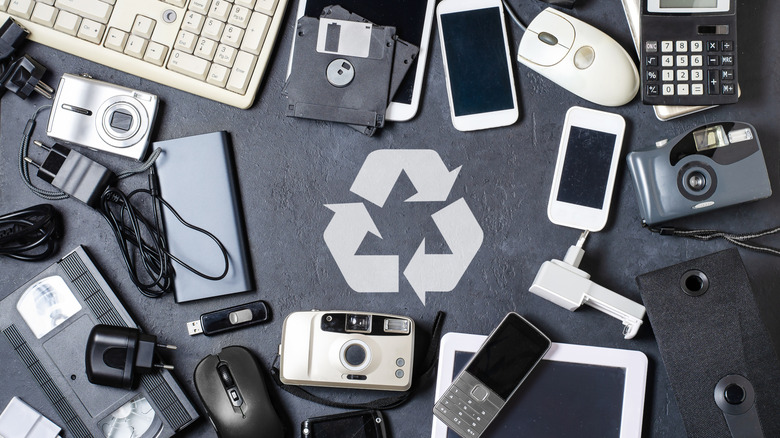You've Been Warned: Don't Move Before Selling These Electronics
When you hire a moving company to take your items to your new location, they may send you a bill based on how much your shipment weighs and the space it takes up. This is based on the Federal Motor Carrier Safety Administration's household goods rules as of 2022, and it means that every extra pound will raise the total. Say a mover charges 85 cents per pound, carrying 150 pounds of outdated electronics like a CRT TV, a desktop tower, an AV receiver, and a few printers, adds $127.50 to your cost. Instead, sell them, just like you would sell kitchen items before moving or certain types of collectibles.
There is a market for old electronics. Bose gives up to $200 credit for Bluetooth or Wi-Fi speakers and up to $300 for sound bars. Sonos offers 15% off a new speaker, and, in some cases, up to 30% when you trade in an eligible one. GameStop's trade-in prices change daily. Yet, you can find a PS5 cashing in for around $190 or $275 in store credit, an Xbox Series X for $210 cash or $300 credit, and a Nintendo Switch OLED for up to $70 cash or $100 credit. Always bring the power cord and controllers to get the highest offer. For speakers, Reverb's price guide shows Sonos Play:1 units selling for about $85 to $135 depending on condition, and similar models often go for $120 to $160.
What to do if it won't sell
If you can't sell or give away your old electronics, the Environmental Protection Agency (EPA) says you should take it to a certified e-waste recycler. In its Electronics Donation and Recycling guidance, which was updated on May 15, 2025, the EPA lists recyclers certified under the R2 or e-Stewards standards. The agency advises to sell or donate first, and if those don't work out, recycle. These methods will keep devices with personal data and hazardous parts out of landfills.
However, before you drop off electronics, take out the lithium-ion batteries from laptops, tablets, speakers, power tools, scooters, and game controllers. The EPA says these batteries should never go in household trash or curbside recycling. Instead, take them to a battery recycling center or a household hazardous waste site. To lower the risk of fire, the EPA advises to tape the battery terminals or put each battery in its own plastic bag before transporting them.
Finally, save your files and photos in a safe place before you sell or recycle a device. Sign out of iCloud, Google, or Microsoft accounts. Take out SIM and SD cards. Encrypt your data, then do a factory reset on phones, tablets, and laptops. On Windows, use the Reset option, and on a Mac, use Erase All Content and Settings. Also, sign out of apps, browsers, and streaming services. These are vital, especially with the rise of AI-powered financial scams that can use your data for fraudulent activities.

